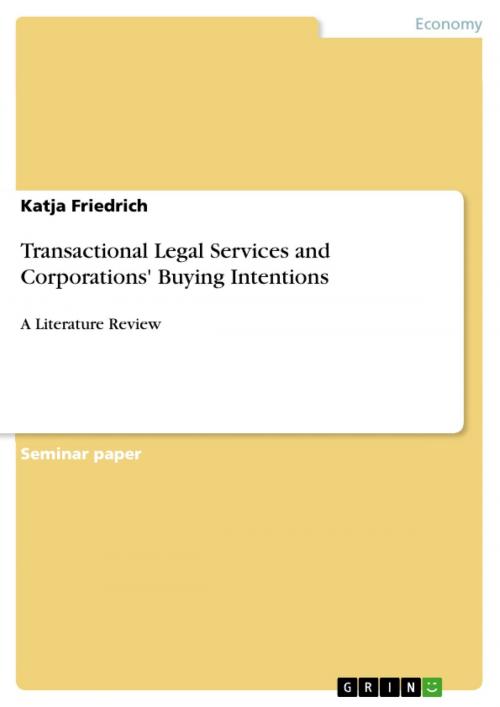Transactional Legal Services and Corporations' Buying Intentions
A Literature Review
Business & Finance| Author: | Katja Friedrich | ISBN: | 9783668608696 |
| Publisher: | GRIN Verlag | Publication: | January 11, 2018 |
| Imprint: | GRIN Verlag | Language: | English |
| Author: | Katja Friedrich |
| ISBN: | 9783668608696 |
| Publisher: | GRIN Verlag |
| Publication: | January 11, 2018 |
| Imprint: | GRIN Verlag |
| Language: | English |
Seminar paper from the year 2017 in the subject Business economics - General, University of Gloucestershire, language: English, abstract: This literature review investigates factors influencing the choice and future buying intentions for transactional legal services at large law firms. In doing so, two marketing concepts, namely perceived service value and commitment are integrated and their relationships examined. There are two parts to this literature review. Part 1 draws on the services marketing literature and reviews past research on legal services' credence attributes, future buying intentions, perceived value and affective and calculative commitment with particular focus on professional services. This part serves to gain a better understanding of the conceptual elements more broadly that would otherwise have been dismissed. Part 2 discusses the results of the systematic literature review undertaken on future buying intentions/the choice of legal services and large law firms. The words 'choice' and 'future buying intentions' are used interchangeably, implying the equivalent meaning in this context. The systematic literature review was conducted in addition to Part 1 because very little academic research on legal services could be found. It served to further circumstantiate and identify elements that are relevant in the legal context. From my findings there are commonly scholars from four different academic disciplines who examine particular aspects of the legal industry, i.e. legal scholars, economists, marketing scholars and sociologists. While legal scholars frequently discuss and analyze the law and ethical aspects of lawyering, economists often focus on the growth of law firms and emphasize the asymmetry of information between customers and service providers. Marketing scholars typically seek to understand particular constructs such as client-attorney relationships, satisfaction or service quality and identify choice criteria in determining the essence of particular constructs from a consumer's and/or corporate client's perspective. Sociologists on the other hand often study the legal profession as a whole. Studies concerned with buying intentions in the legal context usually address the value of legal services in general, law firm growth and/or decision-making. Prior empirical research that focuses on purchasing-decisions for transactional legal work at large law firms or legal work at law firms in general, is scant and mostly undertaken in the United States.
Seminar paper from the year 2017 in the subject Business economics - General, University of Gloucestershire, language: English, abstract: This literature review investigates factors influencing the choice and future buying intentions for transactional legal services at large law firms. In doing so, two marketing concepts, namely perceived service value and commitment are integrated and their relationships examined. There are two parts to this literature review. Part 1 draws on the services marketing literature and reviews past research on legal services' credence attributes, future buying intentions, perceived value and affective and calculative commitment with particular focus on professional services. This part serves to gain a better understanding of the conceptual elements more broadly that would otherwise have been dismissed. Part 2 discusses the results of the systematic literature review undertaken on future buying intentions/the choice of legal services and large law firms. The words 'choice' and 'future buying intentions' are used interchangeably, implying the equivalent meaning in this context. The systematic literature review was conducted in addition to Part 1 because very little academic research on legal services could be found. It served to further circumstantiate and identify elements that are relevant in the legal context. From my findings there are commonly scholars from four different academic disciplines who examine particular aspects of the legal industry, i.e. legal scholars, economists, marketing scholars and sociologists. While legal scholars frequently discuss and analyze the law and ethical aspects of lawyering, economists often focus on the growth of law firms and emphasize the asymmetry of information between customers and service providers. Marketing scholars typically seek to understand particular constructs such as client-attorney relationships, satisfaction or service quality and identify choice criteria in determining the essence of particular constructs from a consumer's and/or corporate client's perspective. Sociologists on the other hand often study the legal profession as a whole. Studies concerned with buying intentions in the legal context usually address the value of legal services in general, law firm growth and/or decision-making. Prior empirical research that focuses on purchasing-decisions for transactional legal work at large law firms or legal work at law firms in general, is scant and mostly undertaken in the United States.







![Cover of the book Controlling im Luftverkehr [Hausarbeit plus Präsentation] by Katja Friedrich](https://www.kuoky.com/images/2003/april/300x300/9783638186049-AZrY_300x.jpg)







